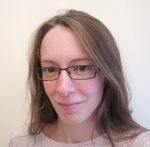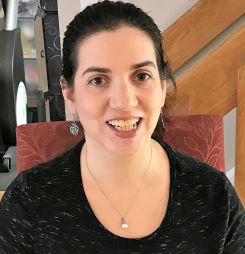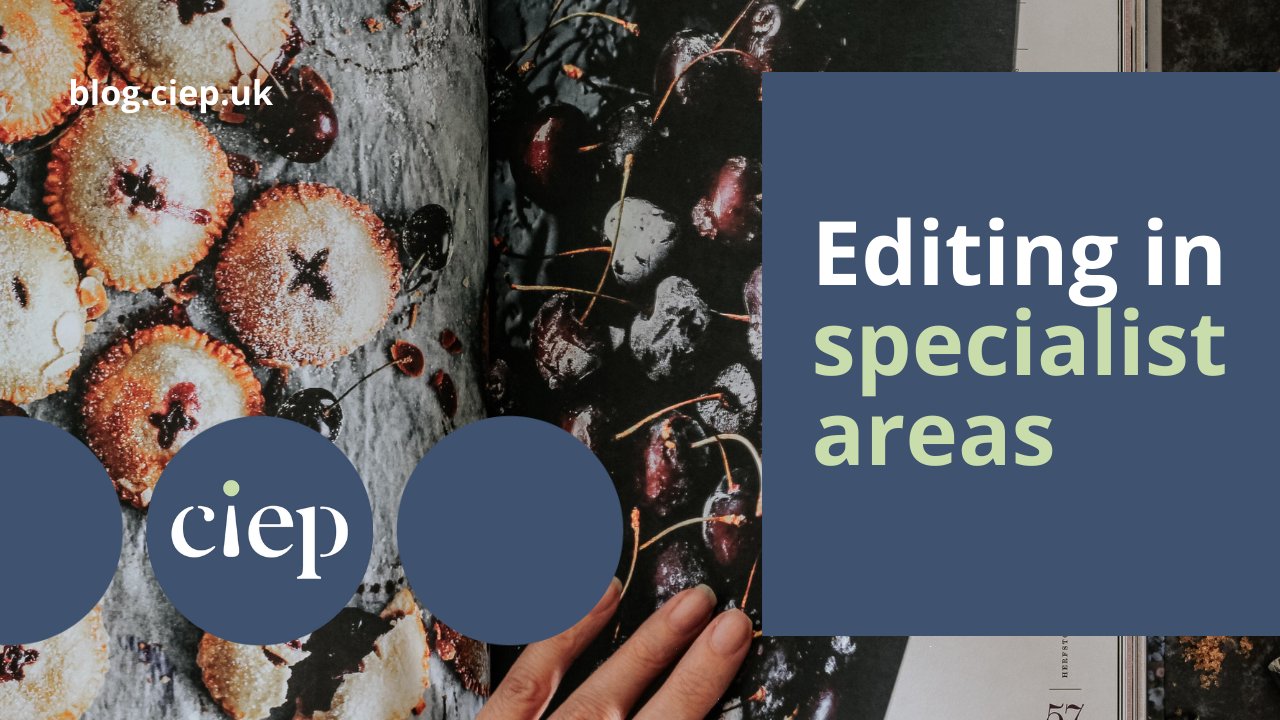It can be easy as a freelance editor to be drawn into editing one type of material (or get stuck in a rut editing one type of material) and not realise what else is out there. This blog post brings together four editors working in diverse areas – cookbooks, school textbooks, RPGs (role-playing games) and construction – to give a flavour of editorial niches that may be new to you. We asked them why they particularly like working in a specific genre, and what they feel is unique about editing that genre.
Wendy Hobson: Cookbooks
 Wendy Hobson specialises in cookery and lifestyle, and wrote the CIEP Guide How to Edit Cookery Books.
Wendy Hobson specialises in cookery and lifestyle, and wrote the CIEP Guide How to Edit Cookery Books.
For me, a good cookbook is not ‘non-stick’; it lives in the kitchen and is used and abused until the pages are stuck together with egg white and dusted with cocoa. I get great satisfaction from the work involved in making sure each book is as good as it can be. Here are a few pointers on what is involved.
Eye for detail: All the usual editorial rules apply in terms of consistency, accuracy and clarity of ingredients, quantities, timing, techniques and the like. Many people follow recipes to the letter so it’s my job to make sure that letter isn’t a ‘b’ in the wrong place – think tbsp/tsp hot spice!
Experience: Each book is unique, cooks are seldom writers, they may be used to restaurant quantities and they rarely do international conversions, so there’s a lot to think about.
Creativity: A book is a unique expression of the author’s passion and I must make sure the reader can prepare food that showcases that passion. There’s a fine line between applying editorial rules and squeezing the life out of a text.
Pragmatism: I imagine rolling my sleeves up before I start and going through each step as though I am cooking the recipes. What is missing? Is the technique clear? How come I’m halfway through before I discover I should have soaked the ingredient overnight!
Market-led: The text needs to match the reader. How frustrating for a beginner to stumble on ‘heat to hard crack stage’! How infuriating for an expert to find a lengthy explanation of how to whisk!
I enjoy the challenge of making sure this is all seamless and the reader never stumbles as they reproduce the food as it was meant to be served.
For more information, see How to Edit Cookery Books, the CIEP Guide free for members to download.
Harriet Power: School textbooks
 Harriet Power spent eight years working in-house for educational publishers, and school textbooks still form the core of her freelance business.
Harriet Power spent eight years working in-house for educational publishers, and school textbooks still form the core of her freelance business.
I never sit in bed at night and read textbooks for fun, but I do genuinely enjoy editing them. In a nutshell, what I like most about textbook editing (particularly for KS3 or GCSE) is the puzzle of explaining tricky topics in an accessible, objective, succinct but still accurate way.
One of the things that I think is fairly unique to school textbooks (at least compared to a lot of fiction or trade non-fiction) is the issue of space: there’s always a word count limit and there’s usually too much to fit into the space available. The GCSE textbooks I work on often have a rigid structure, where one double-page spread equals one topic.
So let’s say we’ve got room for 1,000 words on the topic of abortion in a GCSE Religious Studies textbook. Those 1,000 words have to work really hard to introduce and explain abortion, present religious teachings on it, then give arguments for and against it – all in a way that’s accurate but accessible enough for teenagers to understand, and as ‘objective’ as possible so the author (or publisher) doesn’t appear to be favouring any particular position. That takes a lot of skill, and I love working with authors to cram as much information as possible into those 1,000 words without sacrificing accuracy, objectivity or accessibility.
I also like editing textbooks because to me it feels worthwhile. I think knowledge is a really powerful way to make the world a better place and I get satisfaction from helping, in my own small way, to make it accessible to teenagers.
Rachel Lapidow: Role-playing games (RPGs)
 Rachel Lapidow is a freelance copyeditor and proofreader who works on RPGs, board games, comics and manga.
Rachel Lapidow is a freelance copyeditor and proofreader who works on RPGs, board games, comics and manga.
When I first got into freelance copyediting over five years ago, I initially wanted to edit science fiction and fantasy novels. But after working on RPGs I discovered that they are one of my favourite types of projects due to their mix of technical writing and fiction.
Role-playing games (commonly referred to as RPGs) are games where you get to make a lot of decisions about how you want to approach certain tasks. For instance, when it comes to fighting do you want to be sneaky and stealthy, seeking out your enemies under cover of night? Or do you prefer to be brash instead, and boldly announce your presence to your foes? Tabletop RPGs (aka TTRPGs, the most popular of which is probably Dungeons & Dragons) are collaborative games often played in person. One person acts as the game moderator (aka GM) and the other people play as characters that they’ve created.
In RPG books there are sections, such as rules, equipment types and game conditions, where things are laid out in a simple, concrete manner. Other portions are written with more lyrical prose in order to better build the world of the game. Sometimes these latter sections read more like short stories. Because there are often a lot of different chapters, a style sheet is critical to make sure that language is used consistently. Many independent game creators don’t have house style guides, so it’s often the copyeditor’s responsibility to create and maintain one. Your style sheet should make it clear how game terms – like spells and abilities – are treated.
Getting to edit and proofread RPGs has led me to meet so many wonderful game creators, writers, illustrators and fans, and my love of science fiction and fantasy frequently comes in handy. While I wouldn’t say that editing an RPG is as fun as playing one, it is still a process that I really enjoy.
Julia Sandford-Cooke: Construction
 Julia Sandford-Cooke became a specialist in construction after working for the Construction Industry Training Board.
Julia Sandford-Cooke became a specialist in construction after working for the Construction Industry Training Board.
If you can build a picture of what someone is like from their CIEP Directory listing, I’m not sure what mine says about me. Clients don’t seem as interested in ‘escape rooms’ and ‘Norfolk’ as in the line that reads:
Construction: bricklaying, Building Regulations, built environment, carpentry, construction industry legislation, health and safety, planning/surveying, plastering.
This surprising specialism developed when I came to manage the publishing team at the Construction Industry Training Board in 2004. I had little knowledge of construction, but I did have plenty of experience producing vocational resources at Harcourt Education (now absorbed into Pearson).
Our bestseller was the weirdly named ‘GE700: Construction Site Safety’, at that time a 1,000-page ringbinder explaining the statutory health and safety duties of construction site managers. ‘The Yellow Book’, as customers fondly called it, was updated each year by our internal specialists, in line with changes to legislation.
Now, of course, it’s updated online in real time, but then we were constantly immersed in the details of vital legislation such as the Construction (Design and Management) Regulations, for which we also produced guidance in partnership with the Health and Safety Executive.
From GE700 came spin-offs for all levels of site staff. We used to say if one life was saved as a result of our publications, it was all worthwhile. As a freelancer, this experience has informed my choice of project, including writing three books on plastering, and my attitude towards educational resources of all kinds. As an editor, it’s important to know I’m making a difference.
 About the CIEP
About the CIEP
The Chartered Institute of Editing and Proofreading (CIEP) is a non-profit body promoting excellence in English language editing. We set and demonstrate editorial standards, and we are a community, training hub and support network for editorial professionals – the people who work to make text accurate, clear and fit for purpose.
Find out more about:
Photo credits: cookbook by micheile, dice by Alperen Yazgi, both on Unsplash.
Posted by Harriet Power, CIEP information commissioning editor.
The views expressed here do not necessarily reflect those of the CIEP.


